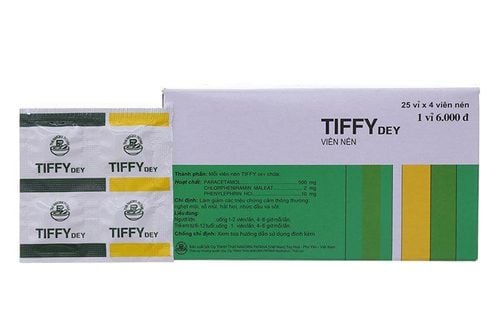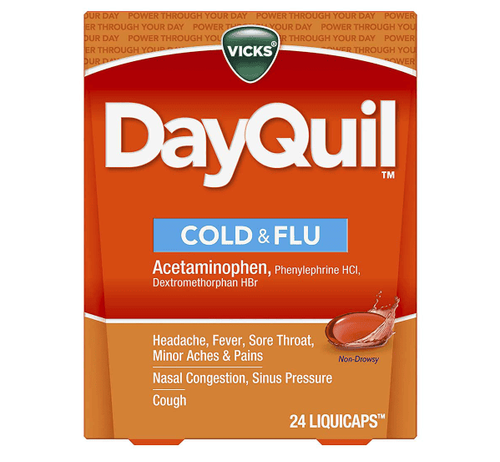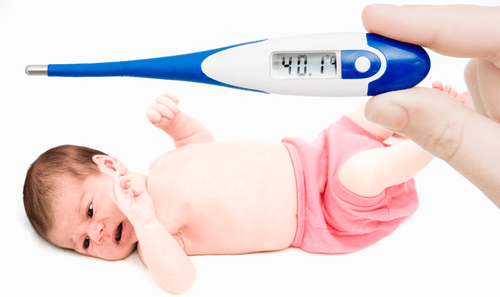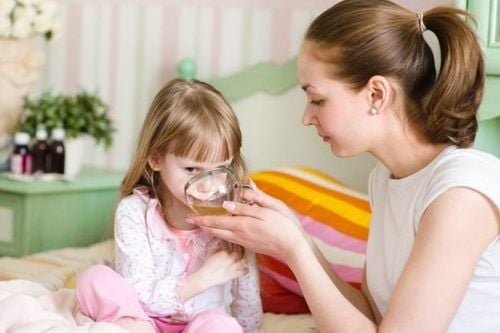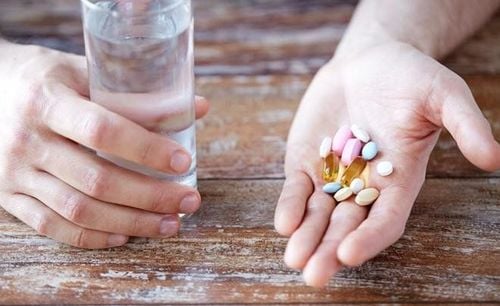This is an automatically translated article.
The article is professionally consulted by Doctor of Pediatrics - Neonatology - Vinmec Hai Phong International General Hospital
Fever in young children can be one of the scariest symptoms for parents, especially when the fever is high or the baby is just a few weeks old. However, fever is not a disease, it is considered a symptom of an illness. A fever usually means that the body is fighting an illness and that the immune system is working. If your baby has a fever, in most cases it means he probably has a cold or a viral infection. Although less common in young children, pneumonia, urinary tract infections, ear infections, or more serious infections such as bloodstream infections or meningitis can cause fever. For more information about fever in young children, the content in this article will be very helpful to help you better understand.
1. A child's rectal temperature of 380C or more is considered a fever
Sometimes moms see babies waking up with rosy cheeks and hot skin. They worriedly took the baby's temperature with a digital rectal thermometer, and the result was that the baby's body temperature was about 37.50C. Time to get your child's medicine or call the doctor? The answer is no. Technically, this isn't even considered a fever yet. A baby's rectal temperature below 380C is considered normal even for newborns.
The temperature of babies and children, just like adults, can rise slightly for a variety of reasons, from overexertion to a warm bath or even overdressing. Even the time of day can affect body temperature. Body temperature usually rises in the late afternoon and falls in the early morning. So unless the measured rectal temperature is above 38oC, mothers can rest assured that the baby does not have a fever.
One note is that heat stroke is sometimes confused with fever. This condition occurs when the body temperature rises to dangerous levels, for example dressing your baby too tight or too many clothes in hot and humid weather. When it's hot, dress your baby in loose, airy clothes and never leave him alone in a closed car for even a minute.
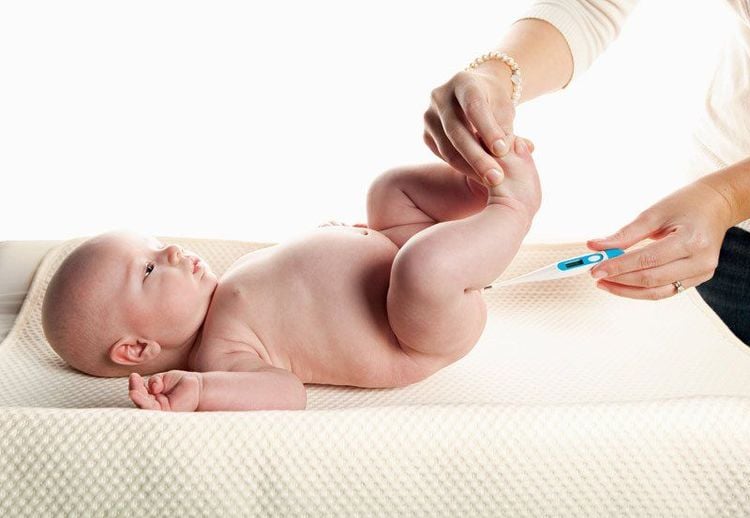
2. Rectal temperature measurement is the most accurate way to measure temperature
Many parents may feel reluctant to use a digital rectal thermometer to measure their baby's temperature, but science has proven that this is the most accurate way to measure baby's temperature for babies. infants and children under 3 years old. However, be careful not to use glass thermometers because if they are broken, the mercury inside the thermometer can flow out, causing harm to the baby.
Tyreese Gaines, emergency room physician in New Jersey, says: “Only a rectal thermometer gives a truly accurate temperature. Armpit thermometers, forehead thermometers, and even ear thermometers aren't nearly as accurate." These thermometers may give a reading that is too low or too high for the actual temperature. in the child's body, so using these thermometers can make young parents think that the child has a fever and bring unnecessary anxiety and stress.
3. Is the fever caused by bacteria or viruses? An important difference
Carrie Brown, pediatrician at Arkansas Children's Hospital in Little Rock, Arkansas, explains: “A viral fever is a condition that occurs when a child's body is fighting illness caused by viruses, even it's an intestinal infection, the flu or the common cold. Viral fevers tend to subside within one to three days or as long as a week. Antibiotics are not needed in this case because they have no effect on the virus.
On the other hand, bacterial fevers are infections caused by certain types of bacteria, such as ear infections (which can be bacterial or viral), urinary tract infections, bacterial meningitis or inflammation. bacterial lung. Bacterial infections are less common than viruses but are more worrisome because they can lead to serious complications if left untreated. Antibiotics are often prescribed to treat infections caused by bacteria.
Make sure your baby always gets all the medical care he/she needs by calling the doctor right away in the following cases:
The baby is under 3 months old and the rectal temperature exceeds 380C. The child is less than 2 years old and the fever lasts more than 24 hours. Children from 2 years old and above and the fever lasts more than 3 days The child's body temperature increases continuously, even surpassing the 400C threshold.
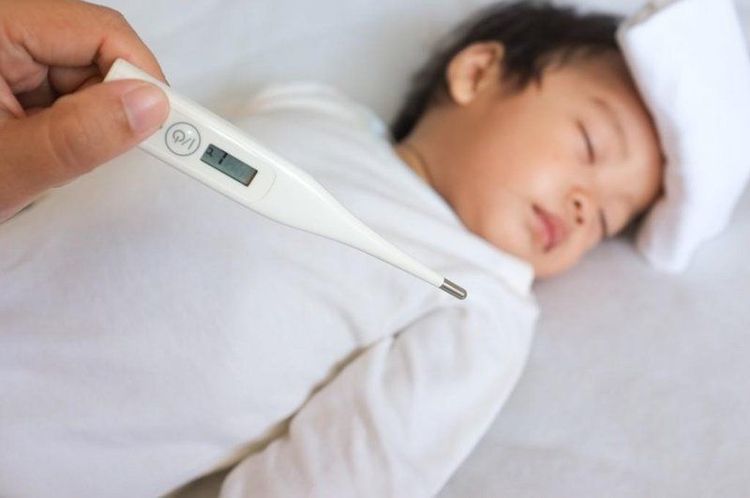
4. Fever in infants under 3 months old
According to the American Academy of Pediatrics (AAP), for babies under 3 months of age, a rectal temperature of 380C or higher should be taken to the doctor as soon as possible. Call your baby's doctor right away to let them know about your baby's condition. If the doctors cannot be reached, take the child to the nearest clinic or medical facility for emergency treatment. Do not give your baby any medicine to lower a fever unless advised otherwise by the doctor.
There are two reasons why a fever above 38°C in a baby under 3 months of age can be considered an emergency. First, the protective layer of cells between the blood stream and the central nervous system in children under 3 years of age is very thin. This means that bacteria can completely bypass this protective layer to directly attack the nervous system causing serious damage. The second reason comes from the fact that children under 3 months of age often do not show signs of severe infection as in older children. Children under 3 months of age can have systemic sepsis without any typical symptoms.
Parents do not need to worry too much in the case of a child under 3 months of age with a fever due to a virus. However, the problem is that it is not possible to distinguish between a bacterial fever and a viral fever just by common symptoms. That's why an infant with a fever may need blood, urine, X-ray, or stool tests to determine if a bacterial infection is present. (Exact tests ordered depend on your baby's age and symptoms.) Newborns with a fever may also need a lumbar puncture to check for meningitis, an uncommon but serious infection that causes inflammation of the protective membranes covering the brain and spinal cord.
5. Body temperature does not determine the severity of the disease
Many parents think that the higher the child's fever, the more severe the illness, but that is not the case. There are children with a fever of up to 39 degrees but can still appear comfortable when placed in bed, but there are children with a fever of only 38 degrees, who may be fussy, tired and need to be held constantly. That means if the child feels comfortable, the mother does not necessarily need to reduce the child's fever. Experts recommend that "treat your baby's discomfort instead of treating the fever".
6. Fever is the body's natural immune response
Remember that fever is a natural response of the body to fight infection. Fever can activate the body's immune system, such as white blood cells, to fight invading viruses and bacteria. Pay attention to your baby's symptoms and behavior to determine your child's condition, and seek medical advice based on those signs. Fever is a healthy response and unlike many parents who have misconceptions about fever, fever actually doesn't hurt a child's nervous system. In essence, fever is not harmful. Even the febrile muscle twitches that some children experience with a sudden rise in body temperature are mostly harmless. Antipyretics can help lower the temperature, but do not prevent febrile seizures.
In short, whether it's a bacterial or viral fever or even a reaction to a vaccine, fever is the body's natural immune response. So rest assured that your baby's immune system is working properly and that they're doing all they can to protect them.
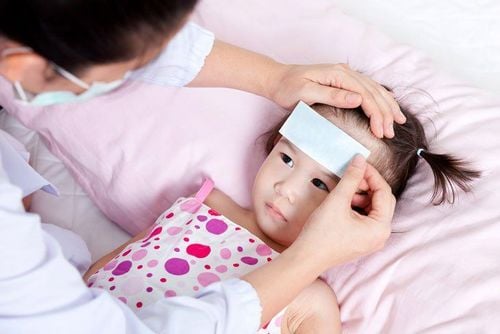
7. Use medicine with caution
Medicines such as ibuprofen and acetaminophen can temporarily lower a fever and help your child feel better. However, before using the medicine, try lowering your baby's body temperature with a cool washcloth to wipe his skin, especially his forehead and armpits. This method is simple but can be very effective.
Another way to help children feel better is to provide adequate amounts of water. So when your baby has a fever, try to breastfeed as much as possible. In addition, you should also choose for children loose clothes and keep the baby's surroundings cool.
If the child still feels uncomfortable, now think about taking fever-reducing medicine. Note, do not give medicine to a child under 3 years old without the guidance of a doctor and need to follow safety guidelines whenever giving the following medicine to a child:
If the child is under 2 years old, talk to them. Talk to your pediatrician to find out the right dose for your baby. If the baby is 3 to 6 months old, mothers can give the child acetaminophen, but not ibuprofen. Beginning at 6 months of age, most babies can take acetaminophen or ibuprofen. The dosage is determined by the baby's weight, not the baby's age. Do not give aspirin to children because it has been linked to Reye's syndrome, a rare but serious (and sometimes fatal) condition in children. Fever is a natural immune response and is more protective than harmful. Most fevers in children are harmless. A fever can be a symptom of an inflammation caused by a virus or bacteria. When the child's body temperature exceeds the threshold of 38 degrees (when measured rectally) it is considered a fever. To reduce fever, before thinking about taking medicine, parents should try to bring down the child's fever naturally, such as applying cool towels, feeding the baby and creating a cool space around the child.
Parents need to pay attention to observe the child's signs of illness to take the child to the doctor in time. In addition, because children are sensitive subjects, combining with care and hygiene for children during fever is extremely necessary, playing an important role in the child's recovery.
Pediatrics department at Vinmec International General Hospital is the address for receiving and examining diseases that infants and young children are susceptible to: viral fever, bacterial fever, otitis media, pneumonia in children, .... With modern equipment, sterile space, minimizing the impact as well as the risk of disease spread. Along with that is the dedication from the doctors with professional experience with pediatric patients, making the examination no longer a concern of the parents.
If you have a need for consultation and examination at Vinmec Hospitals under the nationwide health system, please book an appointment on the website for service.
Please dial HOTLINE for more information or register for an appointment HERE. Download MyVinmec app to make appointments faster and to manage your bookings easily.
Reference source: babycenter.com




